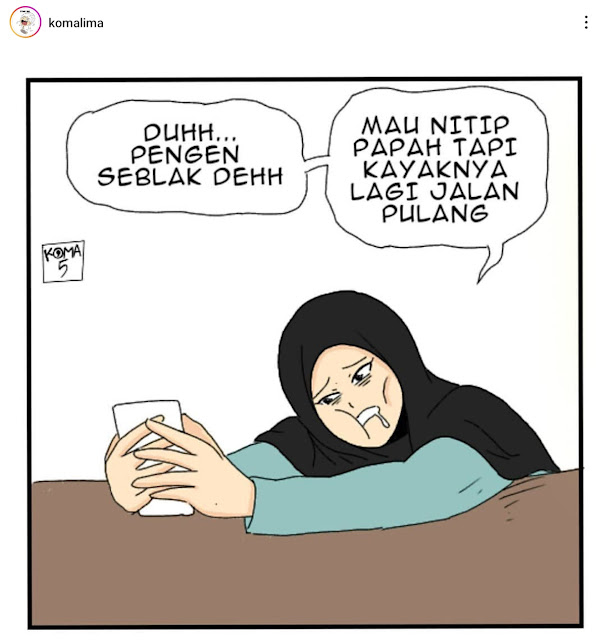- Get link
- X
- Other Apps
Posted by
Iman Prabawa
on
- Get link
- X
- Other Apps
Halo, ketemu lagi sama saya, Iman Prabawa. In this video, I want to talk about the meaning of the word [pengen] in Indonesian. We are also going to be watching examples from movies, comics, and whatnot where the word [pengen] is spoken by Indonesians.
If you have any questions regarding the Indonesian language, you can ask me directly. You can see how to do that on my About Me page.
If you are a beginner in the Indonesian language, you can learn step by step with My Lesson Here.
So, without further ado, let's talk about this.
Pengen In Bahasa Indonesia
[Pengen] is informal for [ingin], which means having a desire to do something or possess something. [Pengen] is usually used in conversational Indonesian.
Example sentences:
1. Gua pengen makan ih! Laper! (I really want to eat! I'm hungry!)
If I change this sentence into a formal sentence, it would be [Saya ingin makan. Saya lapar!]
2. Emak Ijah pengen ke Mekah. (Mrs. Ijah wants to go to Mecca.)
If I change this sentence into a formal sentence, it would be [Emak Ijah ingin ke Mekah].
3. Aku pengen jadi orang terkenal. (I want to be a famous person).
If I change this sentence into a formal sentence, it would be [Saya ingin menjadi orang terkenal].
So, as you can see from the example sentences above, you just change [pengen] into [ingin] if you want to change it into a formal word.
How to Pronounce Pengen
Here is how you pronounce [pengen] in Bahasa Indonesia.
Next, let's look at examples where the word [pengen] is used by Indonesians.
Example of Pengen In Use
The first example we are about to watch is from Dalang Pelo's YouTube Channel. Let's watch it below.
Acil: Ler, Ler, aku pengen deh, Ler. (Ler, Ler, I want it, Ler.)
Leri: Dih! Pengen apaan lu? Ga jelas, dah! (Oh my God! You want what? You're so random!)
Acil: Aku pengen, Ler. (I want it, Ler.)
Leri: Pengen gua tonjokin? Ayo, sini deketin muka lu. (You want me to punch your face? Just move your face toward me.)
Acil: Ih! Kamu mah gitu, deh. (Oh, come on, man.)
Leri: Terus, lu pengen apaan? Yang jelas kalo ngomong! (Then, what do you want? Please be clear when talking.)
Acil: Ini Ler. Aku pengen banget kayak Gagas. Dia keren banget, Ler. Nih, liat deh. (This, Ler. I really want to be like Gagas. He's so cool, Ler. Here, check this out.)
As you can see, they use the word [pengen] in their conversation, and the way they talk to each other is conversational Indonesian.
Vocabulary From the Scene
[Aku] is informal for [saya] = I. For more about this, you can read my article here, Aku in Indonesian.
[Dih] is used to indicate that something is shocking, disgusting, surprising, etc.
[Pengen apaan lu?] <--- If I change it into a formal sentence, it would become [Ingin apa Anda?] = what do you want.
[Apaan] is informal for [apa] = what.
[Lu] is informal for [Anda] = you. For more about this, you can read my article here, Loe in Indonesian.
[Ga jelas] in literal translations is unclear, but [ga jelas] is usually said when someone randomly talks about everything. So, you don't really understand the point of his talking.
[Gua] is informal for [saya] = I. For more about this, you can read my article here, Gue in Indonesian.
[Tonjokin] = punch in the face again and again.
[Deketin] is informal for [dekatkan] = to get closer.
[Ngomong] is the colloquial way of saying [berbicara] = to talk.
[Keren] means cool. For more about this, you can read my article here, Keren in Indonesian.
[Banget] is the colloquial way of saying [sekali] = very. For more about this, you can read my article here, Banget in Indonesian.
[Nih] = here. For more about this, you can read my article here, Nih in Indonesian.
The second example is taken from a comic made by @Komalima on Instagram. You can follow their Instagram to read the comics. Let's look at the picture below.
Duh, pengen seblak dehh. Mau nitip papah tapi kayaknya lagi jalan pulang. (Oh, I really want to eat Seblak so badly. I want to ask hubby to buy it for me, but I guess he's on the way home now.)
Let's learn the vocabulary used in this picture.
Vocabulary From the Picture
[Duh] here is used to represent the feelings of her heart at the time of speaking. In this context, it's like saying [oh].
[Seblak] is an Indonesian dish, as in the picture below.
[Nitip] is when you ask someone to buy or look after something for you.
[Papah] can mean father, but can also mean someone's husband. In this picture, [papah] refers to her own husband.
[Kayaknya] is informal for [sepertinya] = looks like.
[Lagi jalan pulang] = on the way home.
Read also: Kan Meaning In Indonesian
So, this wraps up today's article. If I find another example, Insha Allah, I will update this article again. If you have any questions, just leave them in the comment section below, and I'll happily answer them.
Thank you very much for reading my article, and I'll see you soon. Buh-bye.
- Get link
- X
- Other Apps
Hello, I'm Iman Prabawa a.k.a Pak Guru Iman. I love to share about languages. My Instagram, @iman_prabawa



Comments
Post a Comment